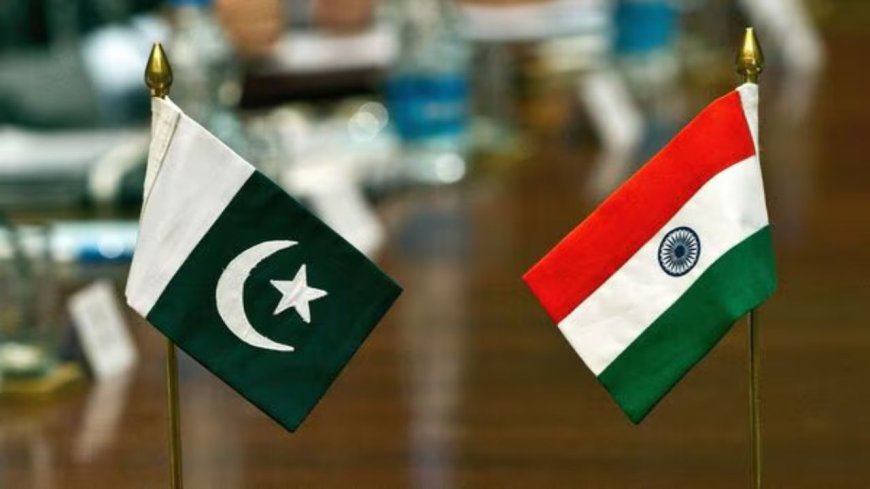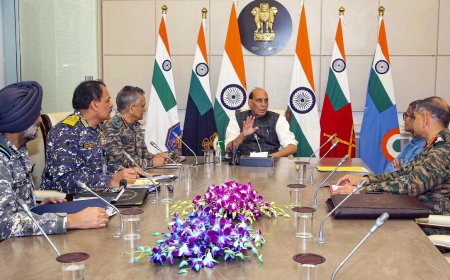Pakistan Declares Indian Diplomat ‘Persona Non Grata’ in Retaliatory Move
In a tit-for-tat response, Pakistan expels a senior Indian diplomat, declaring him persona non grata and ordering him to leave within 24 hours. Tensions escalate amid spying allegations.

🇵🇰 In a Tit-for-Tat Move, Pakistan Declares Indian Diplomat ‘Persona Non Grata’, Asks to Leave Country Within 24 Hours
Islamabad/New Delhi, May 14, 2025 — In a fresh flare-up of diplomatic hostilities between India and Pakistan, Islamabad on Tuesday declared a senior Indian diplomat posted at the Indian High Commission in Islamabad as ‘persona non grata’, ordering him to leave the country within 24 hours. The move comes just days after New Delhi expelled a Pakistani diplomat on charges of espionage, triggering yet another cycle of retaliatory measures between the two nuclear-armed neighbors.
The tit-for-tat expulsion, while not unprecedented, marks a steep deterioration in already fragile bilateral ties, which have remained strained over cross-border militancy, territorial disputes, and diplomatic isolation efforts on global platforms.
What Happened: The Sequence of Diplomatic Escalation
On May 11, Indian authorities detained a Pakistani official from the Pakistani High Commission in New Delhi, alleging that he was involved in espionage-related activities inconsistent with his diplomatic role. Following due procedure, the Ministry of External Affairs (MEA) declared him persona non grata and gave him 48 hours to leave the country.
Just 72 hours later, Pakistan’s Ministry of Foreign Affairs (MoFA) issued a retaliatory statement, expelling a senior Indian official serving in Islamabad. Though the official’s identity has been withheld for security reasons, sources indicate he was part of the Indian diplomatic team managing consular affairs and outreach programs.
Pakistan accused the Indian diplomat of “activities incompatible with diplomatic norms”, a diplomatic euphemism typically used for espionage or political interference.
Pakistan’s Official Statement
In its official release, the Pakistani Foreign Office stated:
“The Government of Pakistan has declared an official of the Indian High Commission in Islamabad as persona non grata. The concerned official was found engaged in activities that contravene the Vienna Convention on Diplomatic Relations.”
The statement further added that the Indian diplomat had been given 24 hours to leave the country, and that India had been informed through official channels.
India's Reaction: Calm, Yet Firm
India, meanwhile, responded with composure. An MEA spokesperson in New Delhi described the move as “regrettable but not unexpected”, adding that such steps only reflect Pakistan’s pattern of reflexive retaliation rather than substance-based diplomacy.
“The Indian diplomat was carrying out duties within the bounds of international norms and the Vienna Convention. Pakistan’s decision is unfortunate and aimed merely at parity,” the MEA said.
Indian strategic experts believe this was a symbolic move by Islamabad to save face domestically after the embarrassment of one of their own being expelled on spying charges.
Diplomatic Expulsions: Not a New Phenomenon
This latest standoff is not the first time India and Pakistan have expelled each other's diplomats. Similar incidents occurred in:
-
2016, when both countries expelled officials amid spying allegations.
-
2019, following India’s abrogation of Article 370 in Jammu & Kashmir.
-
2020, after a Pakistani High Commission staffer was accused of gathering classified Indian military data.
In all such cases, the cycle of accusations and expulsions resulted in a freeze in dialogue, halting even backchannel peace attempts for months.
Experts Speak: A Sign of Deepening Hostility
Prof. Harsh Pant, Observer Research Foundation:
“These moves are less about diplomacy and more about messaging — both to the domestic audience and to the international community. Pakistan is signaling that it won’t take Indian actions lying down, even if the moral high ground isn’t on their side.”
Lt. Gen. Syed Ata Hasnain (Retd):
“Diplomatic expulsions are Cold War tactics, but they are still used in South Asia to convey seriousness. Unfortunately, they close doors to communication at a time when confidence-building is needed the most.”
Ayesha Siddiqui, Lahore-based Analyst:
“Pakistan’s action is reactive. The real concern is that both countries are now operating without meaningful diplomatic insulation, making miscalculations more likely.”
Implications for India-Pakistan Relations
The diplomatic fallout could have several broader implications:
-
Stalling of Dialogue: Any prospects of backchannel talks or regional cooperation may be shelved temporarily.
-
Consular Challenges: With reduced diplomatic staff, both embassies may face difficulties processing visas, prisoner exchanges, and humanitarian requests.
-
Heightened Surveillance: Both nations are expected to tighten scrutiny on each other’s missions, further aggravating distrust.
-
International Optics: Such actions may not go unnoticed by global powers. The U.S., China, and the Gulf nations have previously encouraged bilateral thaw; such tit-for-tat moves do little to instill confidence.
The Larger Context: Cross-Border Tensions Still Alive
Behind this diplomatic tit-for-tat lies a deeper web of security tensions. While the Line of Control (LoC) has been relatively quiet due to the 2021 ceasefire agreement, cross-border infiltration attempts have increased in April and May 2025, according to Indian intelligence.
India also recently issued a dossier to the Financial Action Task Force (FATF) alleging that Pakistan-based terror groups continue to operate training camps with ISI support. The timing of the diplomat expulsion could be a diversion tactic by Islamabad ahead of FATF’s plenary meeting.
Additionally, Pakistan has upped its rhetoric on Kashmir at international forums like the OIC, prompting India to reiterate that “Jammu & Kashmir is an internal matter of India.”
International Response: Cautious, Concerned
Though no country has officially intervened, diplomatic circles in Washington, Brussels, and Riyadh are watching the situation closely. A U.S. State Department official speaking off the record stated:
“We urge both India and Pakistan to avoid escalatory measures and maintain open diplomatic channels.”
The European Union echoed similar sentiments, stating that “dialogue, not disengagement, is the path to de-escalation.”
Recent Timeline of Events
| Date | Event |
|---|---|
| May 11, 2025 | India expels Pakistani diplomat for alleged espionage |
| May 12, 2025 | Pakistan summons Indian envoy to lodge protest |
| May 13, 2025 | Pakistan declares Indian diplomat persona non grata |
| May 14, 2025 | Indian diplomat ordered to leave within 24 hours |
Vienna Convention: What Does ‘Persona Non Grata’ Mean?
Under Article 9 of the 1961 Vienna Convention on Diplomatic Relations, a host country can declare any foreign diplomat persona non grata (literally, “an unwelcome person”) without offering an explanation. The diplomat must leave the host country within a reasonable period — typically 24 to 72 hours.
While legal, such moves are rare and signal a breakdown in trust, often employed during deep diplomatic rifts.
The Road Ahead: Can Dialogue Be Resurrected?
While both countries maintain formal diplomatic ties, meaningful dialogue remains elusive. Backchannel talks facilitated by Gulf states in early 2024 reportedly stalled over disagreements on cross-border terror assurances.
With upcoming elections in India (late 2025) and Pakistan (mid-2026), political incentives to de-escalate are limited. However, some hope remains via regional summits like SAARC or Track-2 diplomacy involving retired diplomats and strategic thinkers.
Key Takeaways
| Issue | Insight |
|---|---|
| Diplomatic Expulsion | Pakistan expels Indian official in response to spying charges |
| India’s Response | Calm but firm rejection of allegations |
| Broader Impact | Increased strain on diplomatic ties and consular functions |
| Historical Pattern | Part of recurring India–Pakistan tit-for-tat diplomacy |
| Global Concern | International calls for restraint and dialogue |
The latest round of diplomatic brinkmanship between India and Pakistan underscores how quickly ties between the two neighbors can sour — even in times of relative border calm. While such expulsions grab headlines and serve domestic narratives, they achieve little in resolving core issues — from cross-border terrorism to regional cooperation.
As both nations inch closer to critical domestic transitions and face increasing pressure on the global stage, the time to choose engagement over expulsion, and dialogue over deadlock, is now more urgent than ever.
For now, however, the expulsion stands as yet another reminder: the road to normalized India–Pakistan relations remains long, winding, and riddled with diplomatic landmines.
What's Your Reaction?
 Like
0
Like
0
 Dislike
0
Dislike
0
 Love
0
Love
0
 Funny
0
Funny
0
 Angry
0
Angry
0
 Sad
0
Sad
0
 Wow
0
Wow
0












































































